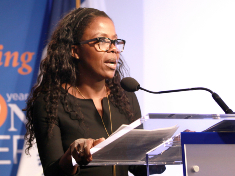-
Patricia Da Silva: ‘The Time is Now’ to Accelerate Progress for Sexual and Reproductive Health and Rights
January 25, 2019 By Isabel Griffith “Almost everyone of reproductive age—about 4.3 billion people—will not have access to at least one essential or reproductive health intervention over the course of their lives,” said Patricia Da Silva, Associate Director, International Planned Parenthood Federation United Nations Liaison Office. She spoke at a recent Wilson Center event showcasing recommendations from the Guttmacher-Lancet Commission report, “Accelerate progress–sexual and reproductive health and rights for all,” on how to advance sexual and reproductive health from a human rights perspective.
“Almost everyone of reproductive age—about 4.3 billion people—will not have access to at least one essential or reproductive health intervention over the course of their lives,” said Patricia Da Silva, Associate Director, International Planned Parenthood Federation United Nations Liaison Office. She spoke at a recent Wilson Center event showcasing recommendations from the Guttmacher-Lancet Commission report, “Accelerate progress–sexual and reproductive health and rights for all,” on how to advance sexual and reproductive health from a human rights perspective.“Almost everyone of reproductive age—about 4.3 billion people—will not have access to at least one essential or reproductive health intervention over the course of their lives,” said Patricia Da Silva, Associate Director, International Planned Parenthood Federation United Nations Liaison Office. She spoke at a recent Wilson Center event showcasing recommendations from the Guttmacher-Lancet Commission report, “Accelerate progress–sexual and reproductive health and rights for all,” on how to advance sexual and reproductive health from a human rights perspective.
The Commission presents a “comprehensive, evidence-based, and integrated vision of sexual and reproductive health and rights (SRHR) that recognizes that improving health depends on rights,” said Da Silva. Guaranteeing that all people, regardless of who they are or where they live, have access to “affordable, essential, and attainable” sexual and reproductive health services is a core pillar of the Commission.
Countries tend to focus on certain components of SRHR, such as improving access to contraception, HIV prevention, and maternal and newborn health services, but the Commission includes often neglected components of sexual and reproductive health, such as “abortion, infertility treatment, LGBTQI friendly services, youth friendly services, comprehensive sexuality education, as well as the prevention, detection, and management of gender-based violence,” said Da Silva.
Some key recommendations from the Commission include providing access to safe abortion services for all women, supporting changes in policies that enable all people to understand, protect, and fulfill their sexual and reproductive health and rights, ensuring universal access to an integrated package of sexual and reproductive health services, with a particular focus on reaching vulnerable populations, and finally, addressing sexual and gender-based violence through policy changes and prevention programs.
Existing gaps in access to sexual and reproductive health can create consequences not only for individuals and communities, but also for national economies around the world, said Da Silva. Investing in and ensuring access to reproductive services for all, primarily contraception, and high-quality maternal and newborn health services would result in a net savings of 6.9 billion dollars. “Spending money now, making corrective policy actions now, can save huge economic benefits for the future,” said Da Silva.
“The rights-based roadmap approach proposed by the Commission…it is the way to accelerate progress for SRHR. It is the way to achieve sustainable and equal development for all. And ladies and gentlemen, colleagues, the time is now.”
This audio was recorded at a Wilson Center event hosted on January 10, 2019.
Sources: The Lancet
Friday Podcasts are also available for download on iTunes and Google Podcasts.
 A Publication of the Stimson Center.
A Publication of the Stimson Center.

 “Almost everyone of reproductive age—about 4.3 billion people—will not have access to at least one essential or reproductive health intervention over the course of their lives,” said Patricia Da Silva, Associate Director, International Planned Parenthood Federation United Nations Liaison Office. She spoke at a
“Almost everyone of reproductive age—about 4.3 billion people—will not have access to at least one essential or reproductive health intervention over the course of their lives,” said Patricia Da Silva, Associate Director, International Planned Parenthood Federation United Nations Liaison Office. She spoke at a 

